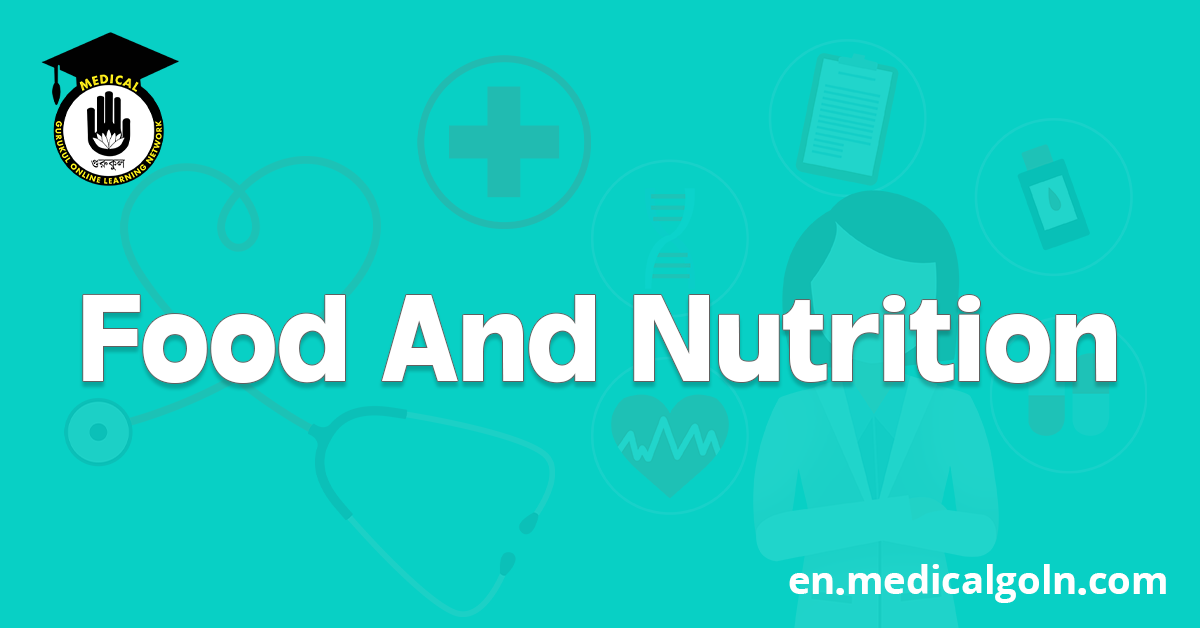Today is our topic of discussion Food And Nutrition
Food And Nutrition

Food:
Foods are those chemical substances which an individual takes, digests, assimilates and thus provide the nutritive requirements of the body for maintaining growth and physical wellbeing.
Functions of food:
1. It supplies energy.
2. It is essential for growth.
3. It is essential for the repair of daily wear and tear
4. It protects the body from various types of diseases.
5. It is involved in the functioning of body processes.
Classification of food:
According to source:
1. Animal foods – Milk, egg, meat etc.
2. Plant foods – Vegetables, cereals, pulses etc.
According to function:
1. Energy yielding foods – These foods are rich in carbohydrates and fats. Example – cereals, sugar, roots, tuber etc.
2. Body building foods – These foods are rich in proteins. Example meat, liver, fish, milk, pulses etc.
3. Protective foods – These foods are rich in proteins, vitamins and minerals. Example – milk. egg, liver, green vegetables and fruits etc.
Elements of food:
1. Protein
2. Carbohydrate
3. Fat
4. Vitamins
5. Minerals (salt) and
6. Water
Proximate principles of food:
Proteins, carbohydrates, fats constitute the bulk of nutrients in the daily diet and provide energy. So, they are termed the as the ‘proximate principles of food’. In addition they also perform their respective functions.

Metabolic end products of food:
Carbohydrate——–Monosaccharides———→Energy + CO2 + H₂OF
Fat——————–Fatty acid (mainly)——–→Energy+ CO2 + H2O
Protein—————Amino acid (mainly)——→Energy+Urea, Uric acid, Creatinine
Protein
Definition:
Proteins are large, complex naturally-produced molecules composed of one or more long chains of amino acids, in which the amino acid groups are held together by peptide bonds.
Function of protein in the body:
1. Proteins are required for growth and repair.
2. Proteins are important in the structure of cell membranes, muscles, connective tissue etc.
3. Proteins are important for transport of oxygen by haemoglobin.
4. Proteins are important for maintenance of fluid balance by serum albumin.org
5. Proteins are important in defence mechanisms by y-globulin, which is antibody in nature.
6. They act as enzymes in the catalysis of different reactions and regulate hormonal actions.
Sources of protein:
1. Animal source: Meats, fish, milk, egg, liver
2. Plant source: Pulses, oilseeds, legumes and nuts, grains, vegetables etc.
Amino acid:
These are monomers of protein containing both amino and carboxyl group. There are about 20 different amino acids in our body, of which 10 are essential and 10 are non-essential.
Essential amino acid:
These are the amino acids that are not produced in the body. supplied in diet. Ex-Valine, leucine, isoleucine, lysine, tryptophan etc.

Non-essential amino acid:
These are amino acids that are produced within our body.
See also :
